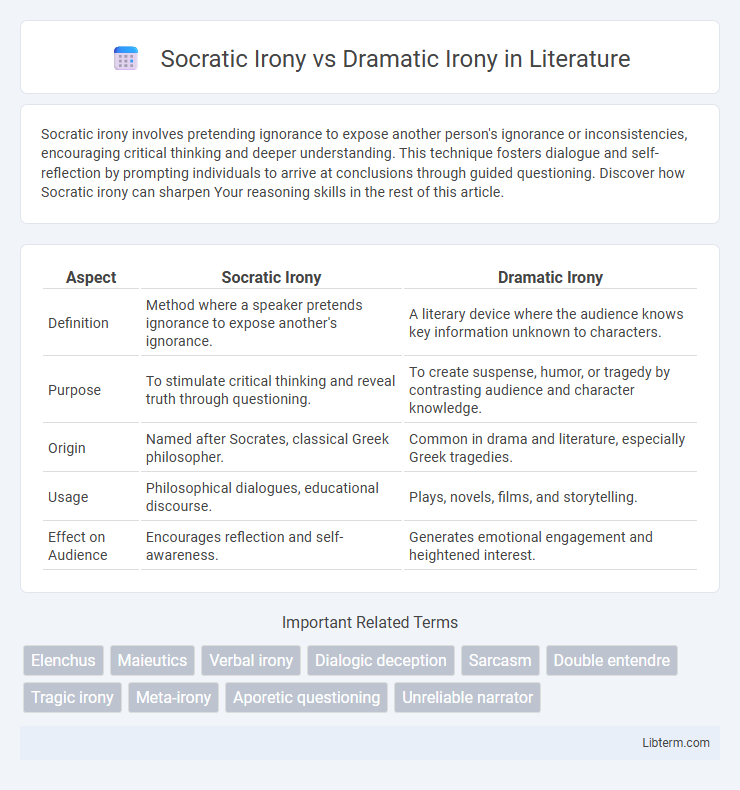Socratic irony involves pretending ignorance to expose another person's ignorance or inconsistencies, encouraging critical thinking and deeper understanding. This technique fosters dialogue and self-reflection by prompting individuals to arrive at conclusions through guided questioning. Discover how Socratic irony can sharpen Your reasoning skills in the rest of this article.
Table of Comparison
| Aspect | Socratic Irony | Dramatic Irony |
|---|---|---|
| Definition | Method where a speaker pretends ignorance to expose another's ignorance. | A literary device where the audience knows key information unknown to characters. |
| Purpose | To stimulate critical thinking and reveal truth through questioning. | To create suspense, humor, or tragedy by contrasting audience and character knowledge. |
| Origin | Named after Socrates, classical Greek philosopher. | Common in drama and literature, especially Greek tragedies. |
| Usage | Philosophical dialogues, educational discourse. | Plays, novels, films, and storytelling. |
| Effect on Audience | Encourages reflection and self-awareness. | Generates emotional engagement and heightened interest. |
Introduction to Irony in Literature and Philosophy
Irony in literature and philosophy serves as a rhetorical device that reveals contradictions between appearances and realities. Socratic irony involves feigned ignorance by Socrates to expose others' ignorance and stimulate critical thinking during philosophical dialogues. Dramatic irony occurs when the audience possesses knowledge unknown to characters, creating tension and highlighting discrepancies between perception and truth within a narrative.
Defining Socratic Irony: Origins and Purpose
Socratic irony originates from the method employed by the ancient Greek philosopher Socrates, who pretended ignorance to stimulate critical thinking and expose contradictions in his interlocutors' beliefs. This technique serves the purpose of encouraging deeper inquiry and self-reflection by feigning naivety, ultimately guiding others toward truth through strategic questioning. Unlike dramatic irony, which relies on the audience's awareness of information unknown to characters, Socratic irony functions as a pedagogical tool aiming to foster intellectual humility and dialogue.
Understanding Dramatic Irony: Key Concepts
Dramatic irony occurs when the audience knows critical information that characters in the narrative are unaware of, creating tension and anticipation. Key concepts include the contrast between character knowledge and audience awareness, which enhances emotional impact and deepens engagement with the plot. This technique is commonly used in classical tragedies and modern storytelling to evoke suspense and emphasize themes.
Historical Context: Socrates and Ancient Greek Theatre
Socratic irony originates from the classical philosopher Socrates in 5th century BCE Athens, where he feigned ignorance to stimulate critical thinking and expose contradictions in others' beliefs. Dramatic irony, rooted in Ancient Greek theatre, especially in tragedies by Sophocles and Euripides, occurs when the audience possesses knowledge unknown to the characters, creating tension and deeper engagement. Both forms reflect key aspects of Athenian culture--philosophical inquiry in Socratic irony and emotional catharsis in dramatic irony--highlighting the interplay between knowledge and human experience in classical antiquity.
Mechanisms of Socratic Irony in Dialogue
Socratic irony operates through a methodical questioning approach where the speaker feigns ignorance to expose contradictions in the interlocutor's beliefs, encouraging critical self-examination and deeper understanding. This mechanism contrasts with dramatic irony, where the audience possesses knowledge unknown to the characters, creating tension through unperceived truths. In dialogue, Socratic irony deliberately uses strategic ignorance to guide conversation, fostering insight by revealing the limits of one's knowledge.
How Dramatic Irony Functions in Storytelling
Dramatic irony functions in storytelling by creating a contrast between what the audience knows and what the characters understand, heightening tension and emotional engagement. This technique allows viewers to anticipate events and develop a deeper connection to the plot as they recognize the implications of characters' actions or words before the characters do. It often amplifies suspense, foreshadows outcomes, and enhances the thematic complexity of narratives.
Contrasting Socratic and Dramatic Irony: Core Differences
Socratic irony involves a speaker pretending ignorance to expose another's ignorance or to stimulate critical thinking, primarily used in philosophical dialogues to guide discovery. Dramatic irony occurs when the audience possesses knowledge that characters lack, creating tension or humor through the disparity between character awareness and audience insight. The core difference lies in Socratic irony's active use of feigned ignorance for inquiry, whereas dramatic irony relies on the audience's superior knowledge to influence emotional engagement with the narrative.
Examples of Socratic Irony in Classical Texts
Socratic irony is exemplified in Plato's "Euthyphro," where Socrates pretends ignorance to expose contradictions in Euthyphro's definitions of piety, prompting deeper philosophical inquiry. In Xenophon's "Memorabilia," Socrates feigns ignorance to challenge interlocutors' assumptions, encouraging critical self-examination. These classical texts showcase Socratic irony as a pedagogical tool, contrasting with dramatic irony where the audience's knowledge surpasses that of the characters.
Notable Instances of Dramatic Irony in Literature
Dramatic irony is prominently showcased in Shakespeare's "Romeo and Juliet," where the audience knows Juliet is alive despite Romeo's belief that she is dead, intensifying the tragedy. Sophocles' "Oedipus Rex" also exemplifies dramatic irony, as viewers grasp Oedipus's true parentage long before he discovers it himself, heightening the play's emotional depth. These instances leverage the audience's superior knowledge to create tension and underscore themes of fate and misunderstanding.
Implications of Irony: Audience Engagement and Insight
Socratic irony engages the audience by prompting critical thinking through feigned ignorance, encouraging deeper reflection and active participation in uncovering truth. Dramatic irony creates tension and emotional investment as the audience possesses knowledge unknown to characters, enhancing suspense and anticipation. Both forms of irony enrich narrative complexity, fostering insight by challenging assumptions and highlighting contradictions within the story or dialogue.
Socratic Irony Infographic

 libterm.com
libterm.com